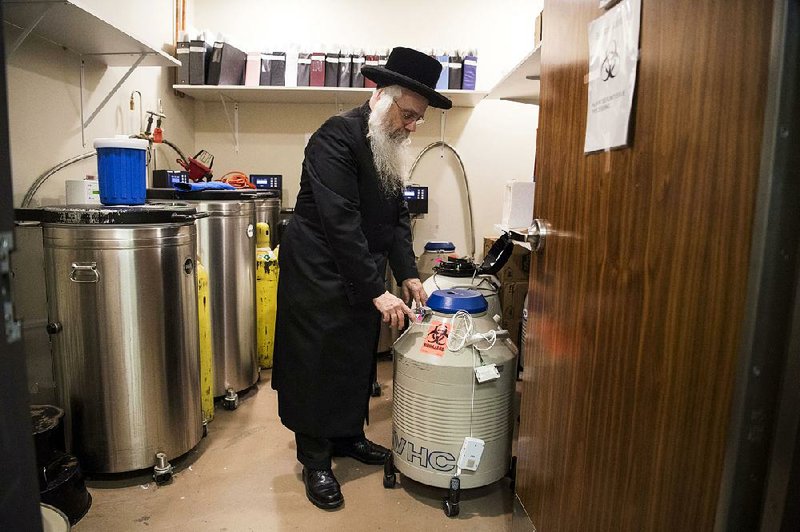BROOKLYN, N.Y. -- Esther Friedman held the Book of Psalms with both hands as she peered over her glasses at the fertility lab monitor. There were eight beautiful round eggs, retrieved from a young woman earlier that day.
"A good number," Friedman said, nodding.
A technician grabbed a long glass tube, filled it with sperm and, within a few minutes, the eggs were fertilized. Eight potential new lives had just been conceived.
Friedman -- an Orthodox Jewish rabbinical observer hired by the prospective parents -- took a step back, lowered her eyes and began to pray.
Forty years ago this July, the world's first "test tube" baby was born at a British hospital in the industrial city of Oldham, heralding a radical change in the creation of human life. Until Louise Joy Brown arrived, hopeful parents had been at the mercy of fate, and a barren marriage could feel like divine punishment.
Afterward, as one of the doctors involved in Brown's birth put it, it seemed that science -- not God -- was in charge.
Since then, in vitro fertilization, or IVF, and related technologies have produced some 7 million babies who might never have existed -- roughly the combined population of Paris, Nairobi and Kyoto -- and the world's fertility clinics have blossomed into a $17 billion business.
The procedures have amplified profound questions for the world's theologians: When does life begin? If it begins at conception, is it a sin to destroy a fertilized egg? What defines a parent? Is the mother the woman who provides the egg or the woman who gives birth? What defines a marriage? If a man's sperm fertilizes an egg from a woman who is not his wife, does that constitute adultery?
The moral questions are rapidly becoming more complex. Researchers are working to advance gene-editing tools that would allow parents to choose or "correct for" certain preferred characteristics; to create artificial wombs that could incubate fetuses outside the body for nine months; and to perfect techniques to produce "three-parent" babies who share genetic material from more than two people.
The risks -- scientific and moral -- are enormous, particularly with gene editing, which could be used to produce babies with superhuman eyesight, speed and intelligence. "Off target" effects could result in fundamental changes not just to human bodies but to human nature.
Some religious leaders have objected to using gene editing on embryos or in ways that could affect future generations, arguing the human genome is sacred and editing it violates God's plan for humanity. The U.S. National Academies of Sciences, Engineering and Medicine have invited religious critiques of the technology, and the Vatican has convened meetings to discuss its moral implications, including one last week in Rome.
Most major religions have indeed come to tolerate -- and even embrace -- IVF, which was originally viewed with equal alarm. But the increasingly commonplace procedure is still condemned at the highest levels of the Catholic Church.
"Technology is a great thing, but technology does change us," said the Rev. Michael J.K. Fuller, executive director of the Secretariat of Doctrine and Canonical Affairs for the U.S. Conference of Catholic Bishops. "At some point, we need to ask -- how much is it changing us, and is that a good thing?"
When Louise Brown was born, Cardinal Albino Luciani, who would soon become Pope John Paul I, congratulated her parents and wished the baby a happy and blessed life. He also said IVF raised many questions that would require a deeper moral response.
Nine years later, in 1987, the church issued the "Donum Vitae" (the Gift of Life), a guidance document on biomedical concerns that has become the definitive Catholic teaching on IVF. In it, the church divided fertility treatments into two categories: Those that help achieve pregnancy through sex -- fertility drugs, ovulation charts, surgery to remove blockages -- are moral. Those that replace sex with technology, including IVF and artificial insemination, are immoral.
"The birth of a baby is always reason for joy. But the question was, what did they do to get there, and what does that mean?" said Richard Doerflinger, a scholar who recently retired from the U.S. Conference of Catholic Bishops, where he served for 36 years as a liaison to Congress on bioethics.
The other primary objection to IVF involves the treatment of fertilized eggs as "products" in a marketplace, as well as their routine creation and destruction. The church teaches that life begins at the moment of conception, and it has condemned the destruction of embryos as an evil on par with abortion and euthanasia.
The current pope has not wavered on the subject.
"We are living in a time of experimentation with life. But a bad experiment," Pope Francis said in 2014 shortly after he was elected to his position. "Making children rather than accepting them as a gift, as I said. Playing with life. Be careful because this is a sin against the Creator."
Some of the first scholarly writings about IVF from Jewish experts were also negative. Rabbi Eliezer Yehuda Waldenberg, one of the most important authorities of his generation on medical concerns, wrote that a baby produced from the procedure was not related to his biological parents. Rabbi Moses Feinstein, known for his writings about women's issues, raised questions about the waste of "seed," or semen.
Attitudes began to change with greater understanding of the procedure. And since the soul does not enter the embryo until 40 days after conception, according to some interpretations of Jewish scripture, unused embryos did not raise the same moral questions. Many Jewish leaders began to actively encourage assisted reproduction, viewing it as a way to heed God's instruction to "be fruitful and multiply."
Technical worries remained, however: Could a woman's eggs be joined with the wrong man's sperm? The solution was rabbinical observers such as Friedman who supervise fertility clinics to make sure they conform to Jewish law and there are no questions about the child's lineage.
The idea originated in Israel, where IVF is universally covered by national health insurance. Working with Friedman and Rabbi Avrohom Friedlander, the Genesis Fertility and Reproductive Medicine clinic in Brooklyn was among the first American clinics to adopt the practice to meet the needs of its large population of Orthodox and Hasidic patients.
"Religious couples who go through infertility, no matter what religion, suffer because it feels like divine punishment," clinic founder Richard Grazi said. "And that makes everything more dramatic and painful."
Monitoring IVF is similar in intensity to certifying kosher restaurants, Friedlander said: Religious observers keep the keys to cryo-tanks where frozen eggs, sperm and embryos are stored and must be present whenever lab technicians handle genetic material. They verify labels and make sure separate surfaces and sometimes equipment are used to avoid mix-ups.
While there are many industry protocols to ensure the integrity of the IVF process, Friedlander said, "rabbis were more comfortable having a divine presence" in the lab.
"When you are dealing with God's creation, you want to make as sure as possible that things are being done right," he said.
Friedman, 63, a mother of six, grandmother to 29 and great-grandmother to one, said she got into the work after seeing so many in her community suffer from infertility.
"I believe in a higher being and that He is good and will help us," she said.
Esther Fixler, who lives near New York, was among the first patients to use the rabbinical monitoring process. Fixler spent a decade trying to get pregnant before coming to Genesis, where she quickly learned her chances of conceiving were very low. In an outburst of emotion, she told Grazi to throw away her genetic material.
Instead, Grazi told her to pray and to have faith. Within a few weeks, she was pregnant with the first of her three children.
"When the pregnancy took, I thought, 'This is God.' I had seen it in black and white, whether I had a chance or not," said Fixler, now 51. "But it wasn't for human understanding how this happened."
Her son, now 20, was married in December 2016. Three months ago, he and his wife welcomed their first child, a girl, Fixler's first grandchild.
Information for this article was contributed by Ellie Silverman of The Washington Post.
Religion on 05/05/2018


